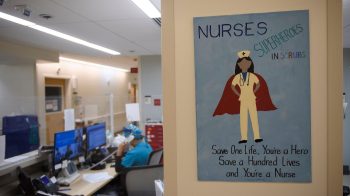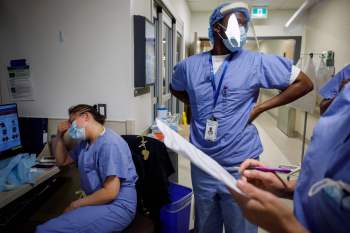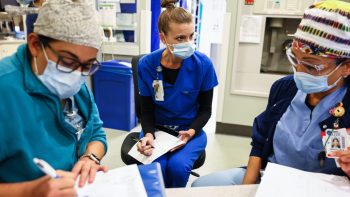Critical condition: Nurse shortage peaks
TEXT OF STORY
KAI RYSSDAL: Between rising medical costs and drug-resistant diseases, there’s plenty about health care to fret over. But we’re obliged to add another thing to the list today: More nurses are quitting. Nurses of a certain age, that is.
New research shows more than a third of nurses born during the baby boom plan to retire or change jobs sometime in the next three years. Add in the chronic shortage of trained nurses already, and that could leave hospitals in critical condition.
From New York, Ashley Milne Tyte reports.
Ashley Milne-Tyte: Trish Bernal is a registered nurse at Virginia Commonwealth University Health System. She qualifies for a state pension this year.
Trish Bernal: And also I’m at a point in my life where I want some work-life balance. I have grandchildren, I have an aging mother.
She’s one of many baby-boomer nurses thinking of retiring soon. She says her hospital is very popular. It’s got a lot to offer nurses wanting to further their careers — but still, there’s a shortage.
Bernal: I think the patients who are in the hospital are sicker, and it’s causing us to have to have a much smaller nurse-patient ratio. And there are periods of time where it’s very difficult to fill positions.
She thinks nursing doesn’t appeal to women the way it used to. She says they have so many more careers open to them than when she started. But Robert Rosseter of the American Association of Colleges of Nursing says there’s no shortage of aspiring nurses. In fact, their numbers have grown.
Robert Rosseter: Last year, we turned away 40,000 qualified applicants to nursing schools. Schools just do not have enough faculty to accommodate growing class sizes accordingly.
Rosseter says things will get worse as the population ages. He says we could have a nursing crisis within the next 15 years.
Rosseter: So if we’re experiencing a shortage now, it’s between 8 and 10 percent of the number of nurses needed. It’s expected to grow to as much as 30 percent by the year 2020.
Right now the U.S. imports a lot of nurses from abroad. But Rosseter says that’s only a temporary solution, since the nursing shortage is global.
I’m Ashley Milne-Tyte for Marketplace.
There’s a lot happening in the world. Through it all, Marketplace is here for you.
You rely on Marketplace to break down the world’s events and tell you how it affects you in a fact-based, approachable way. We rely on your financial support to keep making that possible.
Your donation today powers the independent journalism that you rely on. For just $5/month, you can help sustain Marketplace so we can keep reporting on the things that matter to you.


















